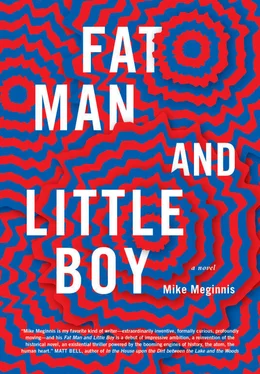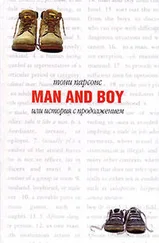“The tree looks like a willow to me.”
“It has a strange aura. Do you believe in auras?”
Fat Man sucks hard on his cigarette. “You want a smoke?”
Glug glug, says the flask. “No.”
“I should go inside,” says Fat Man. “It’s getting cold.”
“With all that blubber?” snorts Masumi. “You’ll be fine. Tell me about the tree.”
“It was here when we came.”
“They let a pretty tree like this grow in a concentration camp?”
“We like to think of it as a hotel.” Fat Man puts on his hat and curls up against the tree as if he means to go to sleep there, cigarette hanging from his lip, a small circle of spark bobbing in the dusk like a leaf on the water.
“It was a camp first.”
“Have you been to our museum?”
“I have,” says Masumi. “It was strange how little it was haunted.”
“I feel very haunted there.”
“Why did you take a dead Jew’s hat?”
Fat Man rolls onto his other side, facing away from Masumi. He does not like this man with his white suits, his sweet liquors, his soft, buzzy voice like something left too long in a can. The tree cannot reach him down here, so low to the ground, nearly wrapped in her roots, which is fine by him, he does not want to be comforted right now, he wants to hate. The coolness in his mind becomes numbness.
“I asked you why you stole a dead Jew’s hat.”
The roots are rough against his face. “I didn’t steal it.”
Masumi keeps his tone breezy, even friendly, the excitement in his body manifesting as a series of rapid climbs and falls in key. “How do you even know it was a Jew’s?” says Masumi.
“When did I say it was a Jew’s hat?”
“There were French in this camp. They wore hats too. And shoelaces, and they used combs and razors, and they brushed their teeth, and they ate from bowls, with spoons, and they drank water from cups, sometimes cups with darling chips or dents in their rims, and they had broken toys and they made art, even, and they wore fancy dress as well—if not here, then at home.” Masumi crawls around the roots, around the fat man, and kneels in front of him, taking a quick gulp of his brandy. Though crouched he looms, nose pulled back into a purple snout, chin knitted up tight like a waffle. “The point is you might be wearing a Jew-killer’s hat, not a Jew’s, and then how would you feel? Or possibly you are wearing a hat stolen from a Jew by a killer, or possibly it was passed from one dead Jew to another in a series, as they died. You think you know who it belonged to but now it belongs only to you. The dead don’t own anything.”
“I don’t know what you’re talking about,” says Fat Man. He rolls onto his other side, then totters back, back up on his ass to sit against the tree. “Why did you come here?”
“I came here to relax and practice languages. What else could I do here?”
“Do you know what your name means?”
“Submarine,” says Masumi. “Submarine in deep water.”
“I don’t believe you.”
“Suit yourself,” says Masumi. He begins to walk distorted circles around the tree, placing his feet heels-first. “What do you think it’s like to die?”
Fat Man twists out his cigarette in the grass and eats the butt. “I imagine it depends on how you go.”
“Give me a for-instance.”
“You’re talking to a hotel employee, Mr. Wakahisa. I can tell you how to get a stain out of sheets. I can tell you how to make a room smell like new. I can tell you how to fry up bacon just the way you like it.”
Masumi leans against the tree with one outstretched hand, crossing his legs at their ankles. He has very nice shoes that skin small feet; they smell of polish. The laces are neat, tight bows. “As a hotel employee, you are living on my money. So I’m not asking, I’m demanding. Tell me what you think it’s like to die.”
The tree like a willow trembles sympathetically.
“I imagine that for some it’s like a long walk into a deep cave. For others, perhaps, like falling down a long ladder, the hands whipping the rungs as they pass, until they’re all red and swollen, until they become the world, until they become the sun, until the burning hands wink out.”
Masumi encourages the fat man to continue, rolling his hands one over the other as if a reel of a film.
“For some it must be like drowning in a shallow pool. For some like cooking on a spit. For some like a burst of white paint across the vision. For some, like an explosion, beginning in the bowels, tearing loose the limbs, blowing the head sky-high.”
Masumi says, “I think for some it’s like sinking to the bottom of the ocean in a tin can with just one window and no way out. As you go deeper the window turns dark, the deepest blue, your arms and legs go numb. You run out of air. You feel it in your feet first, your hands, and then your chest. Then you don’t feel anything, or see anything, but it’s not like you’re smothering to death, it’s just that the water’s so deep, so dark, the deepest blue.” Masumi smiles. “How do you think it’s going to be for you?”
Fat Man isn’t sure he’ll ever die. “I think I’ll be fine.”
“I have a gun,” says Masumi. He pats his side, where there may or may not be a certain bulge beneath his white coat. “I brought it here with me in case I needed to kill anybody.”
“That’s not allowed in this hotel,” says Fat Man. His heart seems to repeat itself too perfectly, too crisply, several times—droplets falling from a sink faucet.
“Is that the widow’s policy, or yours?”
“This hotel is about peace. It only follows there can be no guns.”
“I know who you are.”
“You can’t even keep my name straight.”
Masumi draws his fingers across the white brim of his hat, left to right, and opens his jacket to reveal holstered gun. “I know who you are.”
“Who am I?”
Masumi says, “Who are you,” and leaves Fat Man alone with the question.
The tree like a willow’s shadow has faded into the general darkness of night—it is all dark, it is all shadow. The tree’s weepy branches touch Fat Man as he stands. He runs a hand over one of them, accidentally pulling loose a leaf. It falls into the shadow. There is a lit window in the distance—Rosie’s. It is a thick square of glass, yellowed. The tree seems illuminated because it is most of what he can see. The grass fades to black as it recedes from him. The cabins are still, empty, square blots of night. He is standing on an island built from what light his eyes can wring from the earth.
The skritch skritch of busy hands making notes. The jaw-clenching squeaks of new tin chairs on hardwood floors with too little varnish. The sun-bleached stripes that spill from windows across the aisles students crowd. Someone somewhere eating grapes on the sly. Claire chewing her pencil. The teacher’s drone. The white chalk streaks on the thighs of his pants, the ass of his jacket. The white puffs accompanying any sudden movement.
A fly destined to live forever crawling on the ceiling, tasting things no one can see. They must be body oils, body salts, skin cells. Little Boy knows he’s losing something every second of the day. He resents degrading here, in this too-small room, sloughing himself for the flies and mites and other creeping things. The children. It’s their snot feeds the flies. That’s why they creep under the desks, tickling young knees.
Little Boy’s teacher calls him to the front of the class, one hand pressed to his tummy as if he were taking a pledge. He’s written Matthew’s name on the chalkboard.
“What? What do you want, exactly?” All English. He suspects the teacher understands him. The teacher is an educated man. He wears glasses. He has a fussy center part in his graying hair. He ought to know how to talk the way Little Boy talks.
Читать дальше












